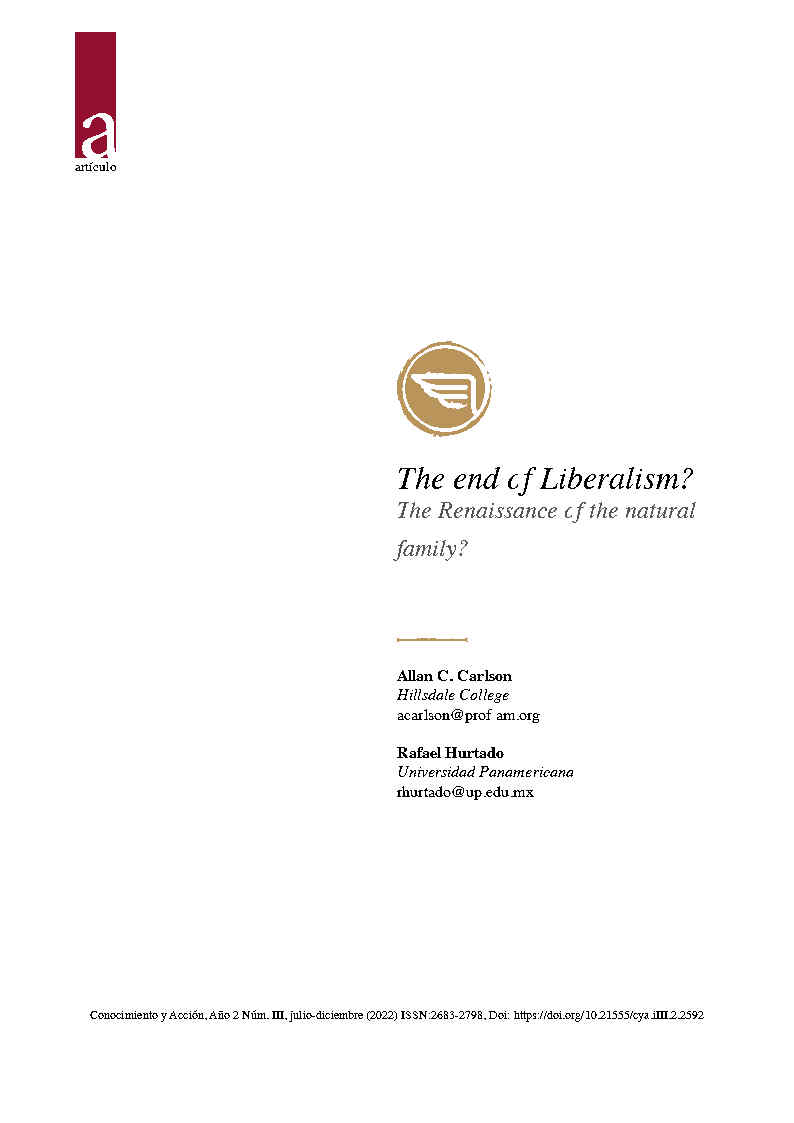
Published 2022-07-04
Keywords
How to Cite
Copyright (c) 2022 Conocimiento y Acción

This work is licensed under a Creative Commons Attribution-NonCommercial-ShareAlike 4.0 International License.
Downloads
Abstract
The article argues that the liberal family system, as crafted by late 17th Century British political theorist John Locke and enjoying apparent success as late as the 1960s, is now in ruins. Three internal contradictions which brought the system down can be identified: the first was a faulty understanding of human nature, which denigrated males and placed too great of the real family burden on women; the second contradiction was the liberal family’s lack of functions, which led to its material and economic disintegration; the third was its reliance on coercive social engineering, which undermined the very religious values which allowed the known system to work. “Self-actualization” and “gender theory,” Carlson and Hurtado show, are the logical consummation of liberalism, and fatal to its natural family order. They also reveal how and why the liberal ideal of tolerance has failed in recent decades.
References
- Abbott, Phillip. The Family on Trial: Special Relationships in Modern Political Thought. University Park: The Pennsylvania State University Press, 1981.
- Andrews, Kevin & Hurtado, Rafael. «Pitirim Sorokin on Marriage, Family and Culture», The
- Chesterton Review, Vol. XLVI, N. 1 & 2, 2020: 127-139
- Andrews, Kevin. Maybe “I do.” Modern Marriage & the Pursuit of Happiness. Victoria: Connor Court, 2012.
- Alvira, Rafael & Hurtado, Rafael. «The Truth about Poverty and Wealth: Reflections on the Centrality of the Natural Family in Economics and Politics» Metafísica y Persona, Year 9, N. 18, 2017: 101-113.
- Boak, Arthur. Manpower Shortages and the Fall of the Roman Empire in the West. Ann Arbor: University of Michigan Press, 1955.
- Cleveland Coxe, Arthur. Fathers of the Third Century. New York: Christian Literature Publishing Group, 1885.
- Deneen, Patrick. Why Liberalism Failed. New Haven, CT: Yale University Press, 2018.
- Goode, William J. World Revolution and Family Patterns. New York: The Free Press of Glencoe, 1963.
- Green, Thomas H. Lectures on the Principles of Political Obligation. Ann Arbor: University of Michigan Press, 1967.
- Lane Fox, R. Pagans and Christians. San Francisco, CA: Harper and Row, 1986.
- Locke, John. Two Treatises on Government. New York: Mentor Books, 1965.
- Mill, John Stuart. The Subjection of Women. Consulted on the 21 of June of 2022 at: gutenberg.org/files/27083/27083-h/27083-h.htm
- Parkin, Tim G. Demography and Roman Society. Baltimore, MD: The Johns Hopkins University Press, 1992.
- Parsons, Talcott. The Social System. New York: The Free Press, 1951.
- Parsons, T. & and White, W. «The Link Between Character and Society». in Lipset, S. M. & Lowenthal, L. eds. Culture and Social Change. New York: The Free Press of Glencoe, 1961, pp. 89-135.
- Rawls, John. A Theory of Justice. Cambridge, MA: Harvard University Press, 1971.
- Sandison, A. T. «Sexual Behavior in Ancient Societies». in Brothwell, D. & Sandison, A. T. eds. Diseases in Antiquity. Springfield, IL: Charles C. Thomas, 1967, pp. 734-743.
- Stark, Rodney. The Rise of Christianity: A Sociologist Reconsiders History. Princeton, NJ: Princeton University Press, 1996.
- Yenor, Scott. Family Politics: The Idea of Marriage in Modern Political Thought. Waco, TX: Baylor University Press, 2011.

